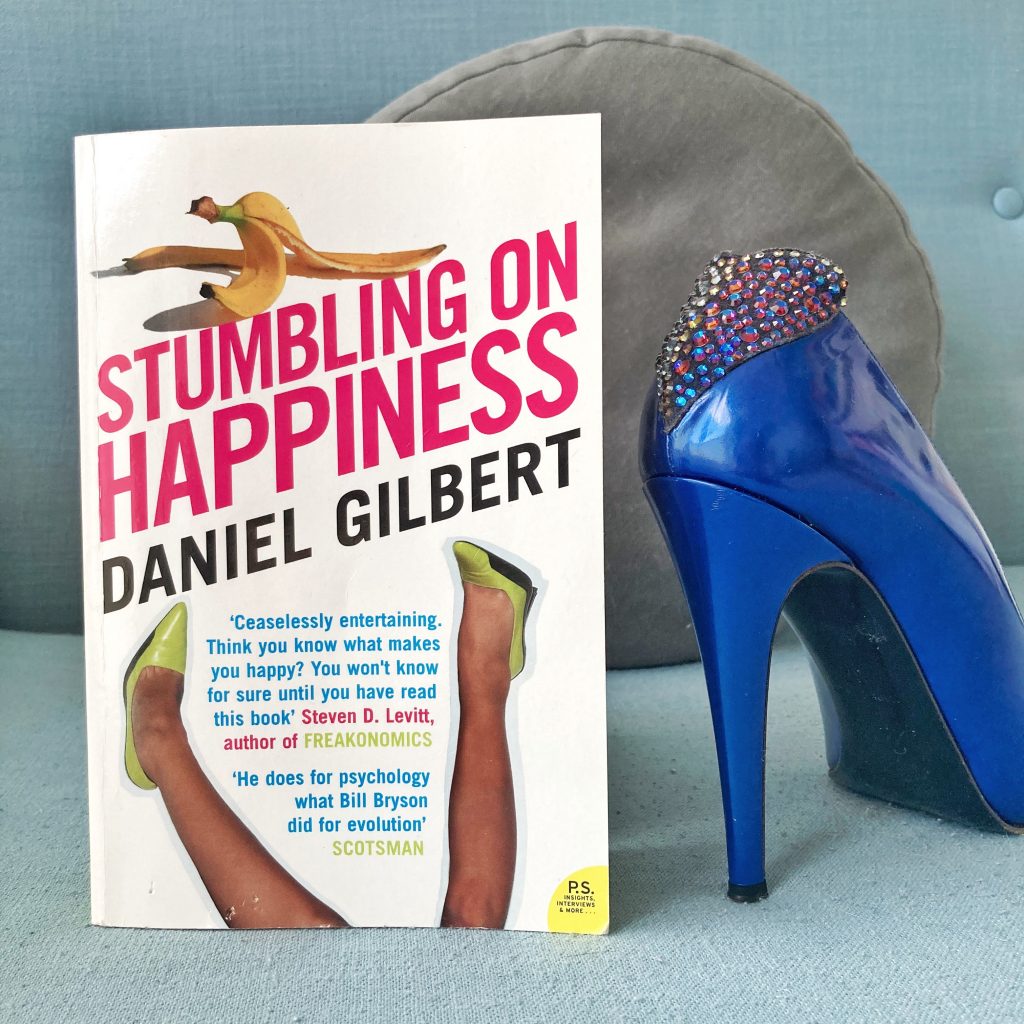so, if you’re interested in stumbling on happiness, because you are looking for a self-help book on how to become happier, keep looking.
if, however, you are looking for a fun introduction into the topic of psychology, then please keep reading.
because daniel gilbert’s stumbling on happiness is the perfect psychology book for beginners.
humour
when i was a teenager (and, ok, most of my twenties), i didn’t see much use in nonfiction books.
in my mind, they were the equally dry and uninteresting cousins of school books.
only that for some reason people read them voluntarily.
for absolutely no credit other than their own amusement and education.
i didn’t get it.
shocking. i know…
luckily, i eventually got over my stereotypes regarding nonfiction literature.
that process would have been a lot faster if had discovered this book when it was first written. which is a whooping fifteen (or so) years ago.
saying that stumbling on happiness is funny or made me laugh is an understatement. saying, however, that reading this book is like watching a late night comedy show is a lot more accurate.
just replace politics and commentary on current events with psychology 101, show host with harvard psychology professor and a 30 or 60 minute TV format with an actual book and you have a better idea of what this book is actually like.
gilbert’s book is such entertaining read with jokes on almost every page, that learning becomes more like an undercover activity.
it is definitely happening, but somehow you almost forget about it.
the science
gilbert’s comedic skills could land him a gig as a stand-up comedian. anytime.
sure.
but that shouldn’t deter you from the fact, that his academic credentials are so stellar, he won’t be needing a back-up career anytime soon.
to this date, stumbling on happiness might be his only nonfiction book that is not a text book.
but as researcher and a psychologist he has authored and co-authored dozens and dozens of peer-reviewed papers in renowned psychology journals.
now for those of us who aren’t exactly sure what this means, this is a big deal in the science world.
a very big deal.
peer-review means that before publication, other researchers in your field go over your work, pick it apart (constructively) and you are then gratefully incorporate their feedback because it improves your work.
as a researcher starting out, being published is what you dream of. it is a seal of quality and gilbert sure knows what he’s talking about.
everything he says is backed up by evidence as illustrated by the pages and pages of notes and references at the end of the book.
not to mention, that this guy literally wrote psychology textbooks. the science doesn’t get much more solid than this.
and if you still need more : have a look at his TED talk
a note on the side
i know that there are people criticising this book (and sometimes psychology in particular) because they believe the findings to be simply common sense or self-evident.
i’d like to refer these people to gilbert’s concept of presentism.
sure, after you heard some results, these might seem obvious to you.
the question however is, would you have known the answer to the question if you were asked just the question without a hint of the answer?
i’ll leave the explaining to gilbert and simply refer you to part IV of the book.
spoiler alert
for the curious ones among you, the short answer is no.
the long answer is also no.
but with more fun detail.
the title and the cover art
now on to the … let’s say … weird.
i understand that when you write a book, you want it to sell.
and that when you want it to sell, you choose a catchy title.
but if there ever was a book to make the top ten of of most unfortunate title book list: this should be it.
side note : i just made that list up. i think.
a more accurate representation of the book’s content would be :
what science has to teach us about how to stumble and err on the path of maybe (but more likely not) finding happiness.
not so catchy anymore… so i guess, i can let it slide.
the cover art, however?
unforgivable.
UNFORGIVABLE!!
so, yeah, i took the cliché to a whole new level with my picture.
but hey, sometimes you just have to have a little fun…
a psychology classic
one reason stumbling on happiness should be referred to as a classic in mainstream psychology literature, is the years it’s been around.
this is not a problem per se.
unless, you just spend 10 minutes on google and you are still not sure whether you read the most current version of this book available.
either way, the speed with which research in this area evolves, means that this detail is crucial.
should this really be the most recent version, now would be as good as ever to write and publish an updated version.
i would read it, that’s for sure.
who this book is for
this book is for
- readers who are looking for an introduction into psychology,
- current or former students of psychology who are looking for an easy refresher of their curriculums, and
- just anyone who likes to learn and laugh while doing it.
feedback
now, it’s up to you.
have you read stumbling on happiness?
if yes, do you agree with my sentiment?
if not, did this review help you to make a choice whether you should read it or not?
please let me know in the comments.
idealistically yours,
the simps














